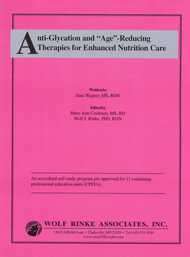|
Get up-to-date evidence-based information, and discover why glycation prevention may be more influential than standard blood glucose management, and why dietary advanced glycation end products (AGEs) is one of the most underutilized strategies in the fight against chronic disease. More specifically you will find out how to:
- Compare and contrast the formation of endogenous and dietary AGEs
- Evaluate risk factors to determine which patients are at high risk for AGE-related disease
- Assess which patients might benefit most from a low-AGE diet and lifestyle
- Formulate and recommend recipes, menu plans, and lifestyle recommendations to assist patients in reducing total AGE burden
- Utilize evidence-based recommendations to counsel patients on AGE prevention and treatment
Share with a friend and Save! Click here for important information about
sharing.
To order an ADDITIONAL Reporting Form click below:
| C333F |
11 CPEUs |
REPORTING FORM |
$50.00 |
|
© 2024 Wolf Rinke Associates. All rights reserved for this self-directed accredited learning activity. Reproduction in whole or part without written permission, except for brief excerpts, is prohibited.
OBJECTIVES
Upon completion of this CPE activity, you will be better able to:
- Discuss the chemical formation of advanced glycation end products (AGEs)
- Compare and contrast the formation of endogenous and dietary AGEs
- Apply knowledge of AGE measuring tools to assess a patient’s AGE burden
- Explain the pathophysiology of AGE-related damage in the human body
- Evaluate risk factors to determine which patients are at high risk for AGE-related disease
- Assess which patients might benefit most from a low-AGE diet and lifestyle
- Evaluate the strengths and limitations of current AGE-related research
- Apply knowledge gained from the primary research literature to plan evidence-based recommendations for patients
- Formulate and recommend recipes, menu plans, and lifestyle recommendations to assist patients in reducing total AGE burden
- Utilize evidence-based recommendations to counsel patients on AGE prevention and treatment
Return to the top of page
If you prefer to order by phone, mail
or fax click below
or click here to contact us with
other questions.
For information about our other products and
services return to the sidebar at the top of the page.
|


